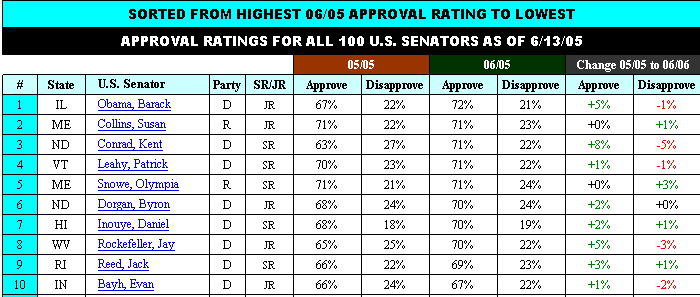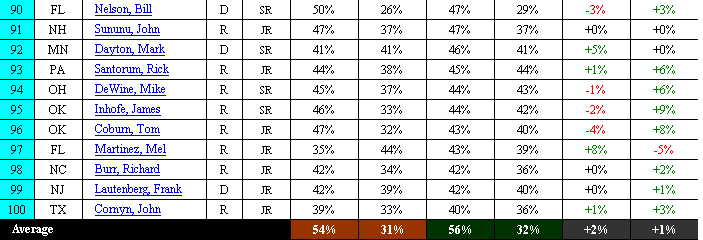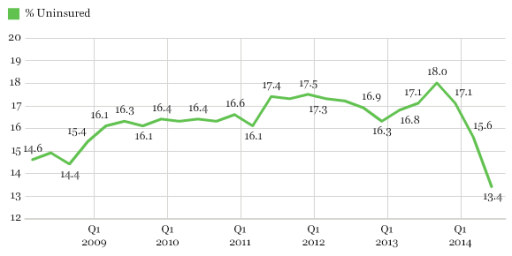Approval Rankings for all 100 U.S. Senators
Survey USA conducted a nationwide, state-by-state survey on the popularity of their own senators. as well as the reputations of all 100 members of the senate.
The top 10:

The bottom 10:

That Obama is the most popular shouldn’t be all that surprising: he has no voting record and is known almost entirely because of the Democratic National Convention speech, which was widely praised. It’s perhaps more surprising that John McCain and Joe Lieberman didn’t make the top 10, but they’re both passionately disliked by a sizable number within their own party.
Hillary Clinton weighs in at #16, which is much higher than I’d have guessed. At first glance, I was surprised by the bottom 10, many of whom are quite innocuous or virtual unknowns. Upon closer examination, though, the ranking is based entirely on positive approval. Most of those at the bottom have scores that add up to far less than 100% — indicating that there was a large “no clue who they are/no opinion on their reputation” segment for them.
I’m not sure what to make of the fact that 8/10 “most popular” senators are Democrats and 8/10 “least popular” are Republicans. That certainly does not reflect the preferences expressed at the election polls.
Update: I misunderstood the nature of the survey. This is merely the in-state views of the senators:
600 adults were interviewed in each of the 50 states. Adults were given the chance to rate only the two Senators from their state.
Compiling these into a national ranking is rather dubious, frankly.
Update (1419): Kevin Drum charts only those Senators whose terms expire this year. There are 17 Democrats, 1 Democrat-voting “Independent,” and 15 Republicans up. So far, we know that Jeffords (I/D), Sarbanes (D), Frist (R), and Dayton (D) are not seeking re-election.






Apples and oranges, James. The approval numbers are from each Senator’s own state, remember — a state in which that Senator won election and, unless a freshman, re-election.
In fact, I’d be more interested in the implications of more junior Senators being in the bottom 100 than the top.
Kevin: No, this set of numbers reflects their NATIONAL approval, not their local approval.
McGehee, I’d be very interested in any Senator that didn’t make the bottom 100.
“No, this set of numbers reflects their NATIONAL approval, not their local approval.”
From the SC results page:
“Analysis: SurveyUSA interviewed by telephone 600 adults age 18+ in each of the 50 United States. Questionnaires in all 50 states were identical. Only the names of the office holders changed from state to state. The exact question wording as read to the respondent follows. Margin of sampling error is incorporated into the results below, and is calculated question by question (and so may vary from one Senator to the next, based on the Senator’s approval rating). Field dates and full statement of methodology at left. The sponsoring media client for each statewide poll appears at left. News stories that cite these results must credit SurveyUSA of Verona, NJ and the sponsoring media organization from each state.”
Looks like local approval ratings to me.
LOL. Can I plead Freudian slip?
On closer reading, you’re right. However, your “state-by-state” at the top of the post suggests otherwise.
(Emphasis mine.) Good catch, Chip — and that’ll teach me to skip over the rest of the thread before responding to a previous comment.
Cantwell, Maria went up 10%. She never talks and has done nothing. How could her approval go up 10%?